Service Excellence: Employee Involvement in Hotel Guest Experience
VerifiedAdded on 2024/05/31
|14
|4577
|413
Report
AI Summary
This report explores the significance of employee involvement in shaping guest experiences within the hotel industry, emphasizing the role of service culture and internal marketing. It examines the evolution of guest expectations and highlights the importance of employee empowerment in delivering exceptional service. Using Park Hyatt in Sydney as a case study, the report discusses how a strong service culture and employee passion can enhance customer satisfaction and drive repetitive business. The analysis also covers the consequences of neglecting service quality and employee well-being, underscoring the need for hotels to prioritize customer-centric services to maintain a competitive edge. Furthermore, the report touches on the integration of technology, such as big data analytics and social media strategies, to improve operational efficiency and customer engagement.
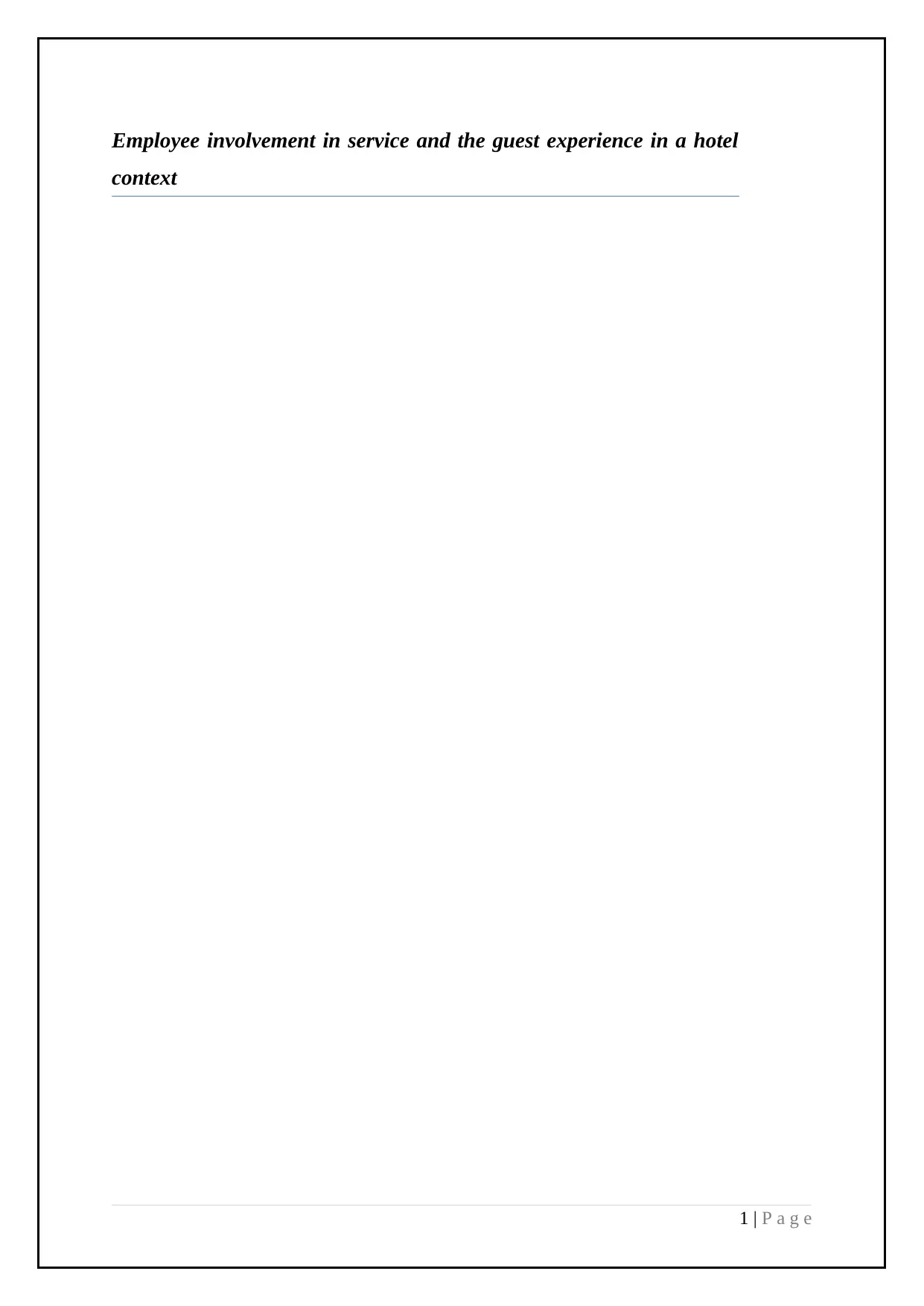
Employee involvement in service and the guest experience in a hotel
context
1 | P a g e
context
1 | P a g e
Paraphrase This Document
Need a fresh take? Get an instant paraphrase of this document with our AI Paraphraser
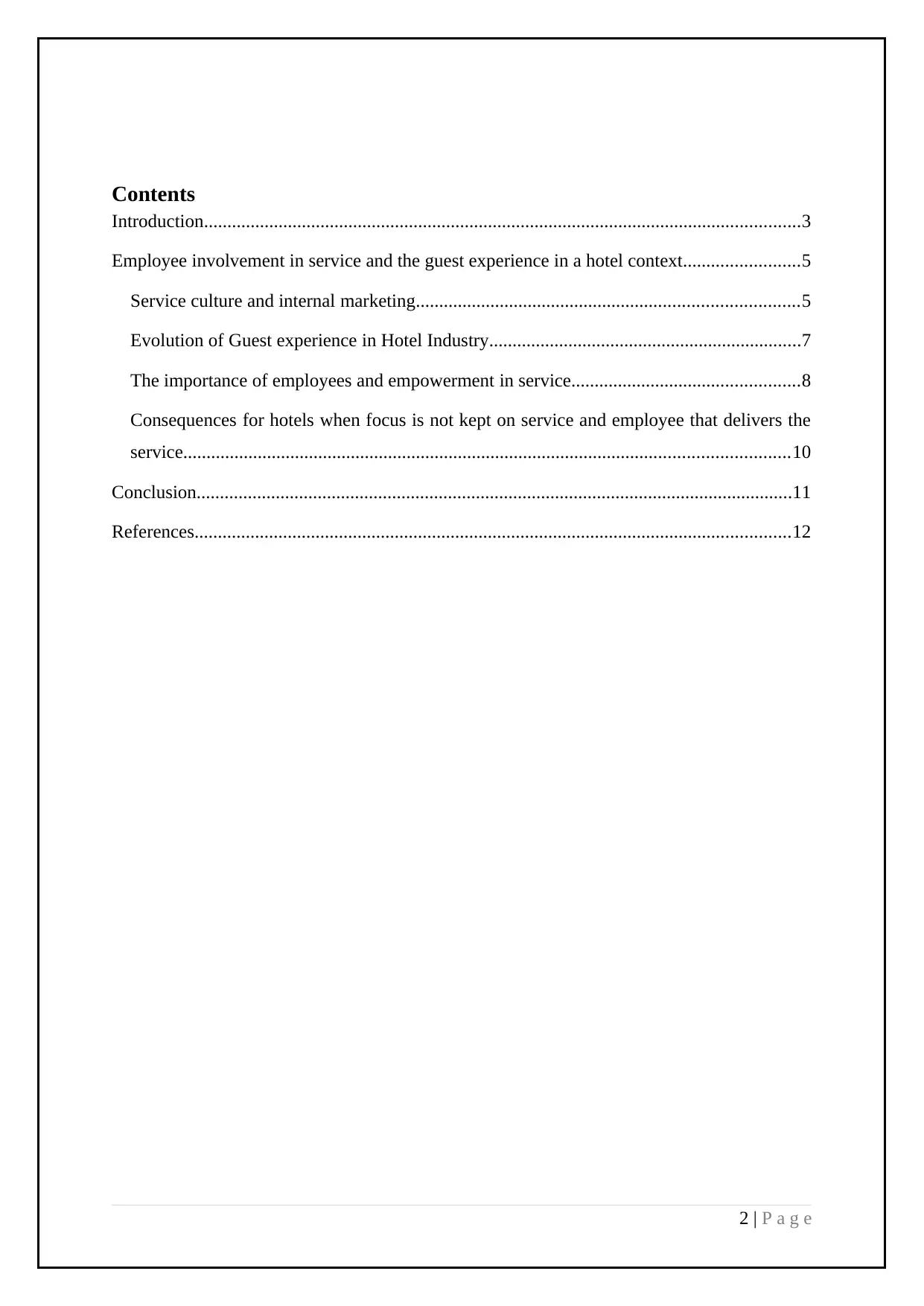
Contents
Introduction................................................................................................................................3
Employee involvement in service and the guest experience in a hotel context.........................5
Service culture and internal marketing..................................................................................5
Evolution of Guest experience in Hotel Industry...................................................................7
The importance of employees and empowerment in service.................................................8
Consequences for hotels when focus is not kept on service and employee that delivers the
service..................................................................................................................................10
Conclusion................................................................................................................................11
References................................................................................................................................12
2 | P a g e
Introduction................................................................................................................................3
Employee involvement in service and the guest experience in a hotel context.........................5
Service culture and internal marketing..................................................................................5
Evolution of Guest experience in Hotel Industry...................................................................7
The importance of employees and empowerment in service.................................................8
Consequences for hotels when focus is not kept on service and employee that delivers the
service..................................................................................................................................10
Conclusion................................................................................................................................11
References................................................................................................................................12
2 | P a g e
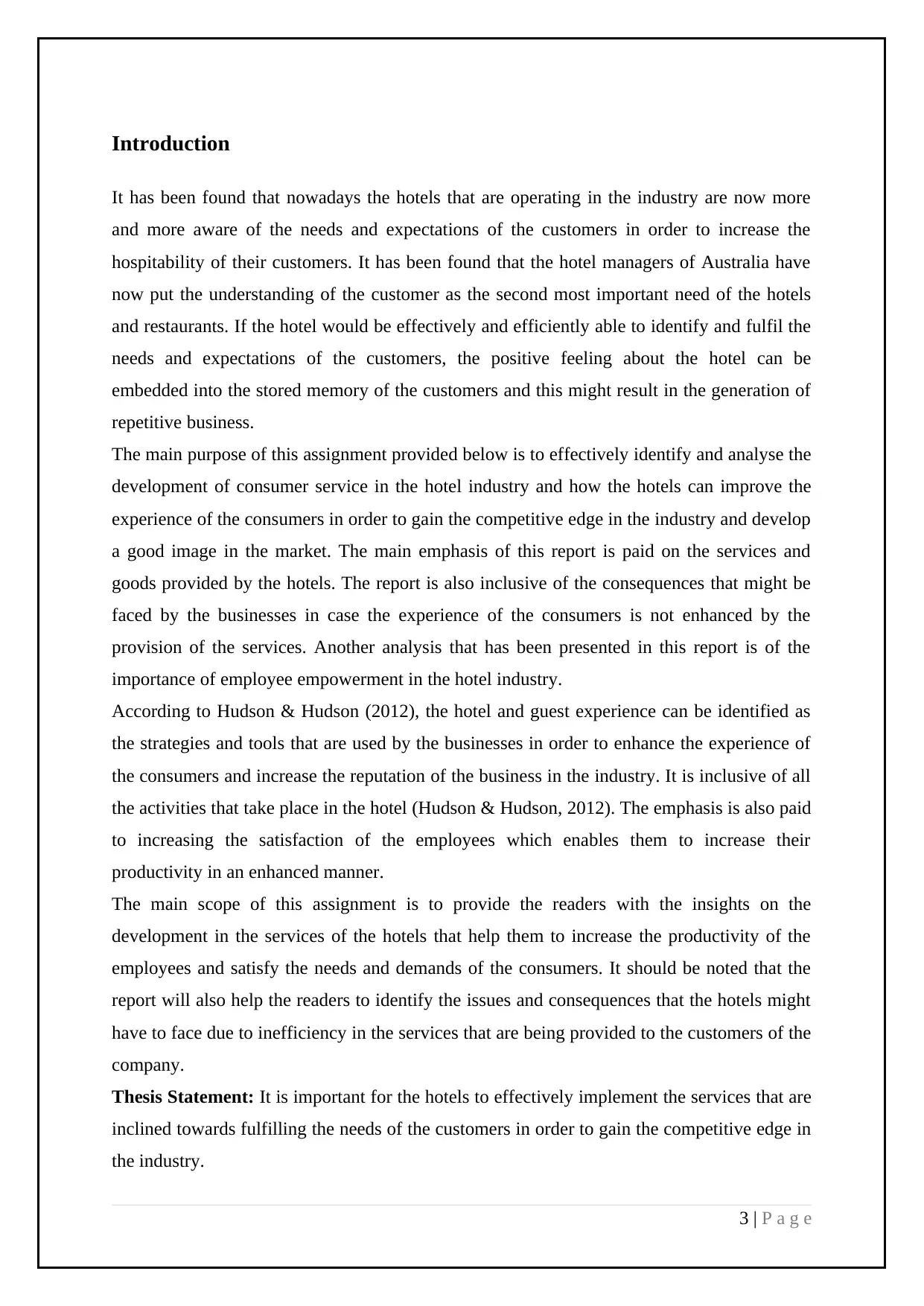
Introduction
It has been found that nowadays the hotels that are operating in the industry are now more
and more aware of the needs and expectations of the customers in order to increase the
hospitability of their customers. It has been found that the hotel managers of Australia have
now put the understanding of the customer as the second most important need of the hotels
and restaurants. If the hotel would be effectively and efficiently able to identify and fulfil the
needs and expectations of the customers, the positive feeling about the hotel can be
embedded into the stored memory of the customers and this might result in the generation of
repetitive business.
The main purpose of this assignment provided below is to effectively identify and analyse the
development of consumer service in the hotel industry and how the hotels can improve the
experience of the consumers in order to gain the competitive edge in the industry and develop
a good image in the market. The main emphasis of this report is paid on the services and
goods provided by the hotels. The report is also inclusive of the consequences that might be
faced by the businesses in case the experience of the consumers is not enhanced by the
provision of the services. Another analysis that has been presented in this report is of the
importance of employee empowerment in the hotel industry.
According to Hudson & Hudson (2012), the hotel and guest experience can be identified as
the strategies and tools that are used by the businesses in order to enhance the experience of
the consumers and increase the reputation of the business in the industry. It is inclusive of all
the activities that take place in the hotel (Hudson & Hudson, 2012). The emphasis is also paid
to increasing the satisfaction of the employees which enables them to increase their
productivity in an enhanced manner.
The main scope of this assignment is to provide the readers with the insights on the
development in the services of the hotels that help them to increase the productivity of the
employees and satisfy the needs and demands of the consumers. It should be noted that the
report will also help the readers to identify the issues and consequences that the hotels might
have to face due to inefficiency in the services that are being provided to the customers of the
company.
Thesis Statement: It is important for the hotels to effectively implement the services that are
inclined towards fulfilling the needs of the customers in order to gain the competitive edge in
the industry.
3 | P a g e
It has been found that nowadays the hotels that are operating in the industry are now more
and more aware of the needs and expectations of the customers in order to increase the
hospitability of their customers. It has been found that the hotel managers of Australia have
now put the understanding of the customer as the second most important need of the hotels
and restaurants. If the hotel would be effectively and efficiently able to identify and fulfil the
needs and expectations of the customers, the positive feeling about the hotel can be
embedded into the stored memory of the customers and this might result in the generation of
repetitive business.
The main purpose of this assignment provided below is to effectively identify and analyse the
development of consumer service in the hotel industry and how the hotels can improve the
experience of the consumers in order to gain the competitive edge in the industry and develop
a good image in the market. The main emphasis of this report is paid on the services and
goods provided by the hotels. The report is also inclusive of the consequences that might be
faced by the businesses in case the experience of the consumers is not enhanced by the
provision of the services. Another analysis that has been presented in this report is of the
importance of employee empowerment in the hotel industry.
According to Hudson & Hudson (2012), the hotel and guest experience can be identified as
the strategies and tools that are used by the businesses in order to enhance the experience of
the consumers and increase the reputation of the business in the industry. It is inclusive of all
the activities that take place in the hotel (Hudson & Hudson, 2012). The emphasis is also paid
to increasing the satisfaction of the employees which enables them to increase their
productivity in an enhanced manner.
The main scope of this assignment is to provide the readers with the insights on the
development in the services of the hotels that help them to increase the productivity of the
employees and satisfy the needs and demands of the consumers. It should be noted that the
report will also help the readers to identify the issues and consequences that the hotels might
have to face due to inefficiency in the services that are being provided to the customers of the
company.
Thesis Statement: It is important for the hotels to effectively implement the services that are
inclined towards fulfilling the needs of the customers in order to gain the competitive edge in
the industry.
3 | P a g e
⊘ This is a preview!⊘
Do you want full access?
Subscribe today to unlock all pages.

Trusted by 1+ million students worldwide
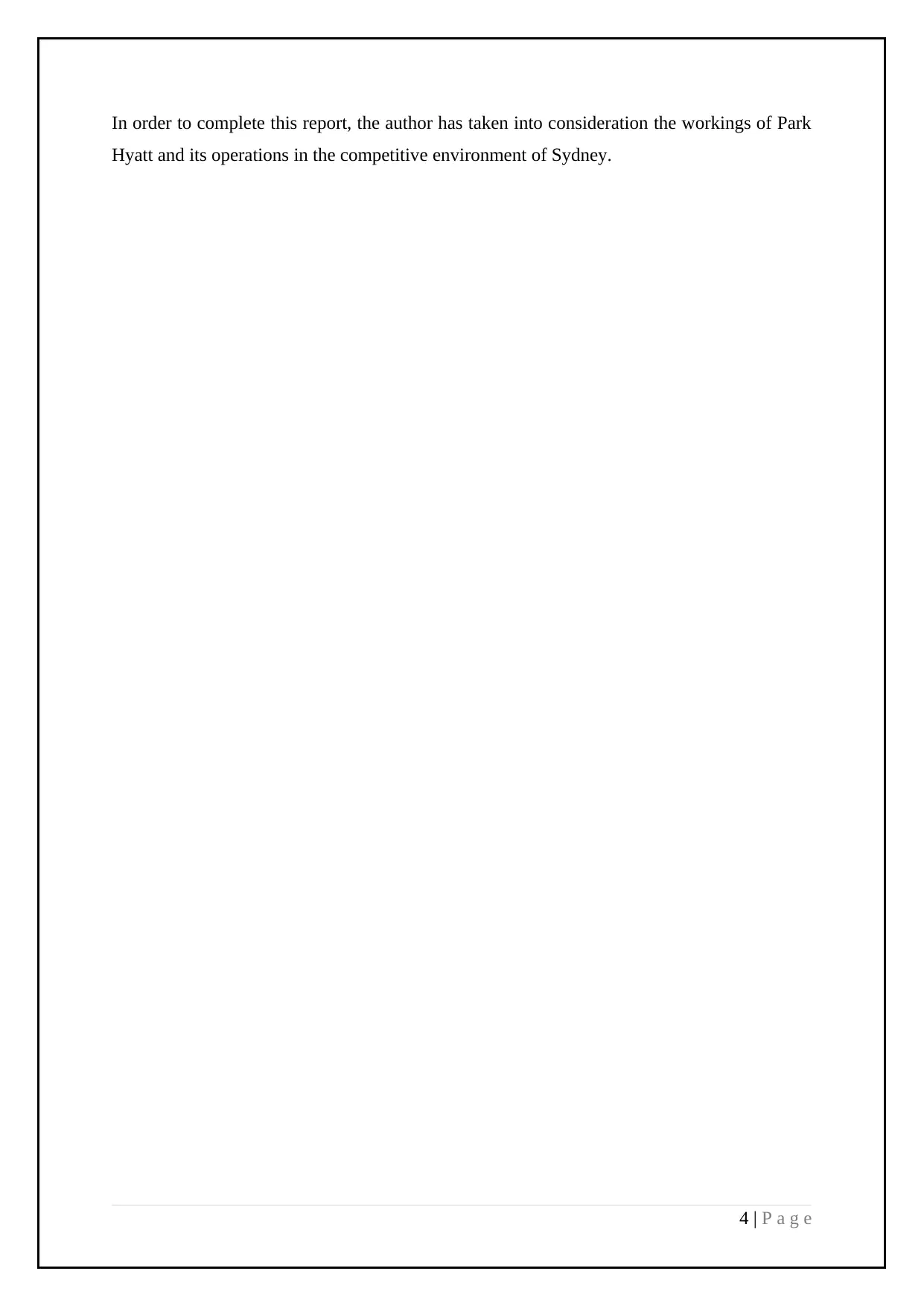
In order to complete this report, the author has taken into consideration the workings of Park
Hyatt and its operations in the competitive environment of Sydney.
4 | P a g e
Hyatt and its operations in the competitive environment of Sydney.
4 | P a g e
Paraphrase This Document
Need a fresh take? Get an instant paraphrase of this document with our AI Paraphraser
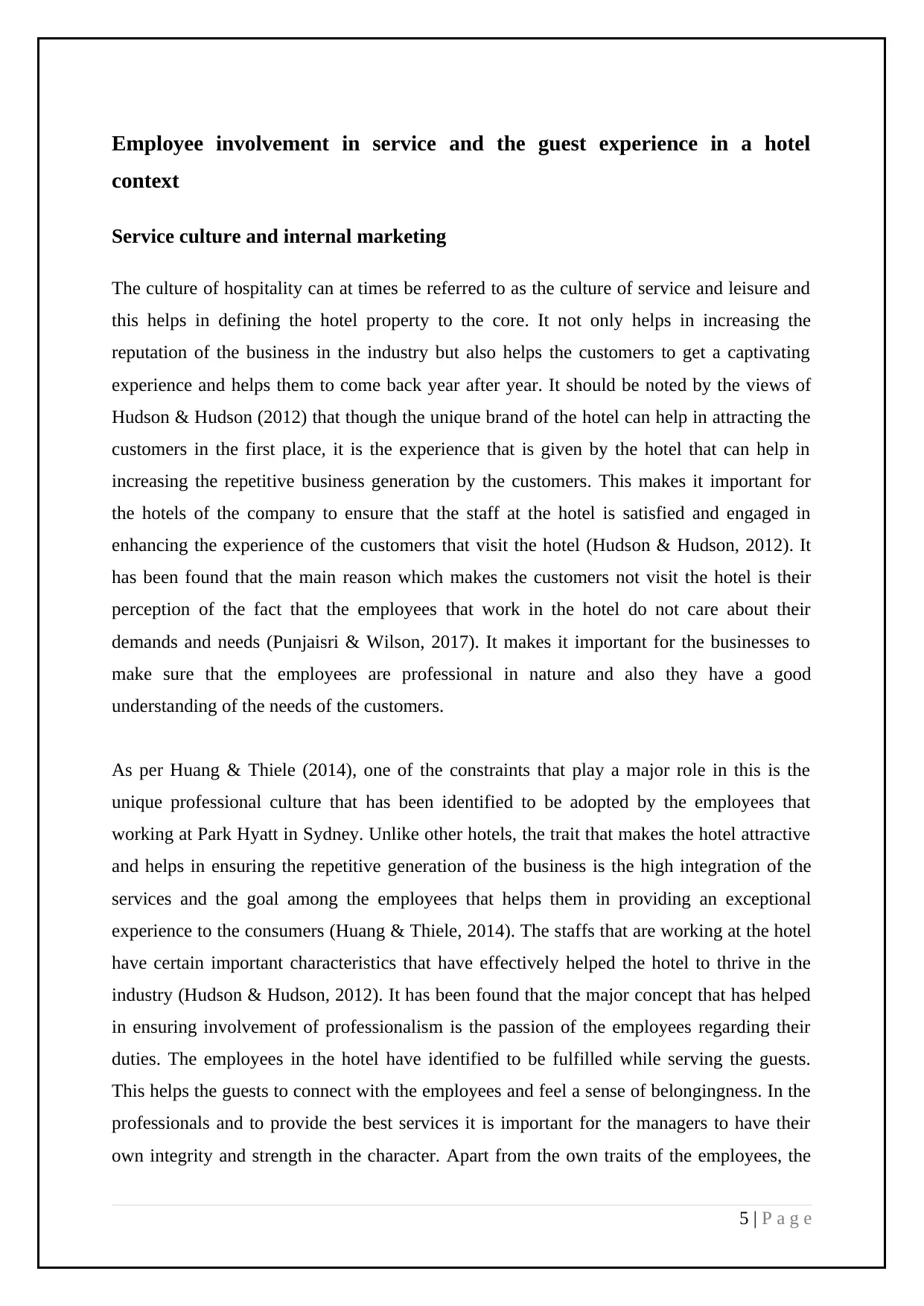
Employee involvement in service and the guest experience in a hotel
context
Service culture and internal marketing
The culture of hospitality can at times be referred to as the culture of service and leisure and
this helps in defining the hotel property to the core. It not only helps in increasing the
reputation of the business in the industry but also helps the customers to get a captivating
experience and helps them to come back year after year. It should be noted by the views of
Hudson & Hudson (2012) that though the unique brand of the hotel can help in attracting the
customers in the first place, it is the experience that is given by the hotel that can help in
increasing the repetitive business generation by the customers. This makes it important for
the hotels of the company to ensure that the staff at the hotel is satisfied and engaged in
enhancing the experience of the customers that visit the hotel (Hudson & Hudson, 2012). It
has been found that the main reason which makes the customers not visit the hotel is their
perception of the fact that the employees that work in the hotel do not care about their
demands and needs (Punjaisri & Wilson, 2017). It makes it important for the businesses to
make sure that the employees are professional in nature and also they have a good
understanding of the needs of the customers.
As per Huang & Thiele (2014), one of the constraints that play a major role in this is the
unique professional culture that has been identified to be adopted by the employees that
working at Park Hyatt in Sydney. Unlike other hotels, the trait that makes the hotel attractive
and helps in ensuring the repetitive generation of the business is the high integration of the
services and the goal among the employees that helps them in providing an exceptional
experience to the consumers (Huang & Thiele, 2014). The staffs that are working at the hotel
have certain important characteristics that have effectively helped the hotel to thrive in the
industry (Hudson & Hudson, 2012). It has been found that the major concept that has helped
in ensuring involvement of professionalism is the passion of the employees regarding their
duties. The employees in the hotel have identified to be fulfilled while serving the guests.
This helps the guests to connect with the employees and feel a sense of belongingness. In the
professionals and to provide the best services it is important for the managers to have their
own integrity and strength in the character. Apart from the own traits of the employees, the
5 | P a g e
context
Service culture and internal marketing
The culture of hospitality can at times be referred to as the culture of service and leisure and
this helps in defining the hotel property to the core. It not only helps in increasing the
reputation of the business in the industry but also helps the customers to get a captivating
experience and helps them to come back year after year. It should be noted by the views of
Hudson & Hudson (2012) that though the unique brand of the hotel can help in attracting the
customers in the first place, it is the experience that is given by the hotel that can help in
increasing the repetitive business generation by the customers. This makes it important for
the hotels of the company to ensure that the staff at the hotel is satisfied and engaged in
enhancing the experience of the customers that visit the hotel (Hudson & Hudson, 2012). It
has been found that the main reason which makes the customers not visit the hotel is their
perception of the fact that the employees that work in the hotel do not care about their
demands and needs (Punjaisri & Wilson, 2017). It makes it important for the businesses to
make sure that the employees are professional in nature and also they have a good
understanding of the needs of the customers.
As per Huang & Thiele (2014), one of the constraints that play a major role in this is the
unique professional culture that has been identified to be adopted by the employees that
working at Park Hyatt in Sydney. Unlike other hotels, the trait that makes the hotel attractive
and helps in ensuring the repetitive generation of the business is the high integration of the
services and the goal among the employees that helps them in providing an exceptional
experience to the consumers (Huang & Thiele, 2014). The staffs that are working at the hotel
have certain important characteristics that have effectively helped the hotel to thrive in the
industry (Hudson & Hudson, 2012). It has been found that the major concept that has helped
in ensuring involvement of professionalism is the passion of the employees regarding their
duties. The employees in the hotel have identified to be fulfilled while serving the guests.
This helps the guests to connect with the employees and feel a sense of belongingness. In the
professionals and to provide the best services it is important for the managers to have their
own integrity and strength in the character. Apart from the own traits of the employees, the
5 | P a g e
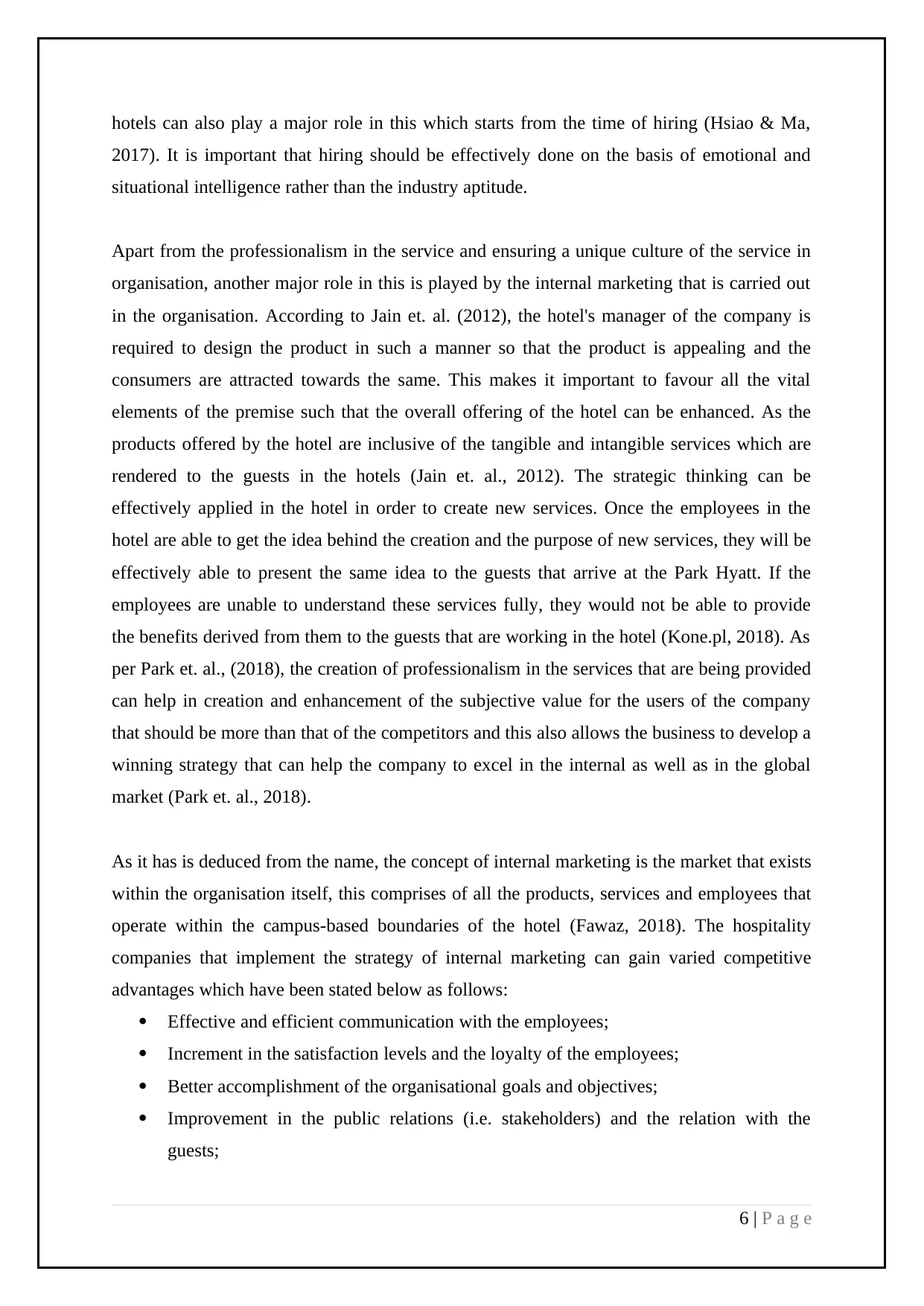
hotels can also play a major role in this which starts from the time of hiring (Hsiao & Ma,
2017). It is important that hiring should be effectively done on the basis of emotional and
situational intelligence rather than the industry aptitude.
Apart from the professionalism in the service and ensuring a unique culture of the service in
organisation, another major role in this is played by the internal marketing that is carried out
in the organisation. According to Jain et. al. (2012), the hotel's manager of the company is
required to design the product in such a manner so that the product is appealing and the
consumers are attracted towards the same. This makes it important to favour all the vital
elements of the premise such that the overall offering of the hotel can be enhanced. As the
products offered by the hotel are inclusive of the tangible and intangible services which are
rendered to the guests in the hotels (Jain et. al., 2012). The strategic thinking can be
effectively applied in the hotel in order to create new services. Once the employees in the
hotel are able to get the idea behind the creation and the purpose of new services, they will be
effectively able to present the same idea to the guests that arrive at the Park Hyatt. If the
employees are unable to understand these services fully, they would not be able to provide
the benefits derived from them to the guests that are working in the hotel (Kone.pl, 2018). As
per Park et. al., (2018), the creation of professionalism in the services that are being provided
can help in creation and enhancement of the subjective value for the users of the company
that should be more than that of the competitors and this also allows the business to develop a
winning strategy that can help the company to excel in the internal as well as in the global
market (Park et. al., 2018).
As it has is deduced from the name, the concept of internal marketing is the market that exists
within the organisation itself, this comprises of all the products, services and employees that
operate within the campus-based boundaries of the hotel (Fawaz, 2018). The hospitality
companies that implement the strategy of internal marketing can gain varied competitive
advantages which have been stated below as follows:
Effective and efficient communication with the employees;
Increment in the satisfaction levels and the loyalty of the employees;
Better accomplishment of the organisational goals and objectives;
Improvement in the public relations (i.e. stakeholders) and the relation with the
guests;
6 | P a g e
2017). It is important that hiring should be effectively done on the basis of emotional and
situational intelligence rather than the industry aptitude.
Apart from the professionalism in the service and ensuring a unique culture of the service in
organisation, another major role in this is played by the internal marketing that is carried out
in the organisation. According to Jain et. al. (2012), the hotel's manager of the company is
required to design the product in such a manner so that the product is appealing and the
consumers are attracted towards the same. This makes it important to favour all the vital
elements of the premise such that the overall offering of the hotel can be enhanced. As the
products offered by the hotel are inclusive of the tangible and intangible services which are
rendered to the guests in the hotels (Jain et. al., 2012). The strategic thinking can be
effectively applied in the hotel in order to create new services. Once the employees in the
hotel are able to get the idea behind the creation and the purpose of new services, they will be
effectively able to present the same idea to the guests that arrive at the Park Hyatt. If the
employees are unable to understand these services fully, they would not be able to provide
the benefits derived from them to the guests that are working in the hotel (Kone.pl, 2018). As
per Park et. al., (2018), the creation of professionalism in the services that are being provided
can help in creation and enhancement of the subjective value for the users of the company
that should be more than that of the competitors and this also allows the business to develop a
winning strategy that can help the company to excel in the internal as well as in the global
market (Park et. al., 2018).
As it has is deduced from the name, the concept of internal marketing is the market that exists
within the organisation itself, this comprises of all the products, services and employees that
operate within the campus-based boundaries of the hotel (Fawaz, 2018). The hospitality
companies that implement the strategy of internal marketing can gain varied competitive
advantages which have been stated below as follows:
Effective and efficient communication with the employees;
Increment in the satisfaction levels and the loyalty of the employees;
Better accomplishment of the organisational goals and objectives;
Improvement in the public relations (i.e. stakeholders) and the relation with the
guests;
6 | P a g e
⊘ This is a preview!⊘
Do you want full access?
Subscribe today to unlock all pages.

Trusted by 1+ million students worldwide
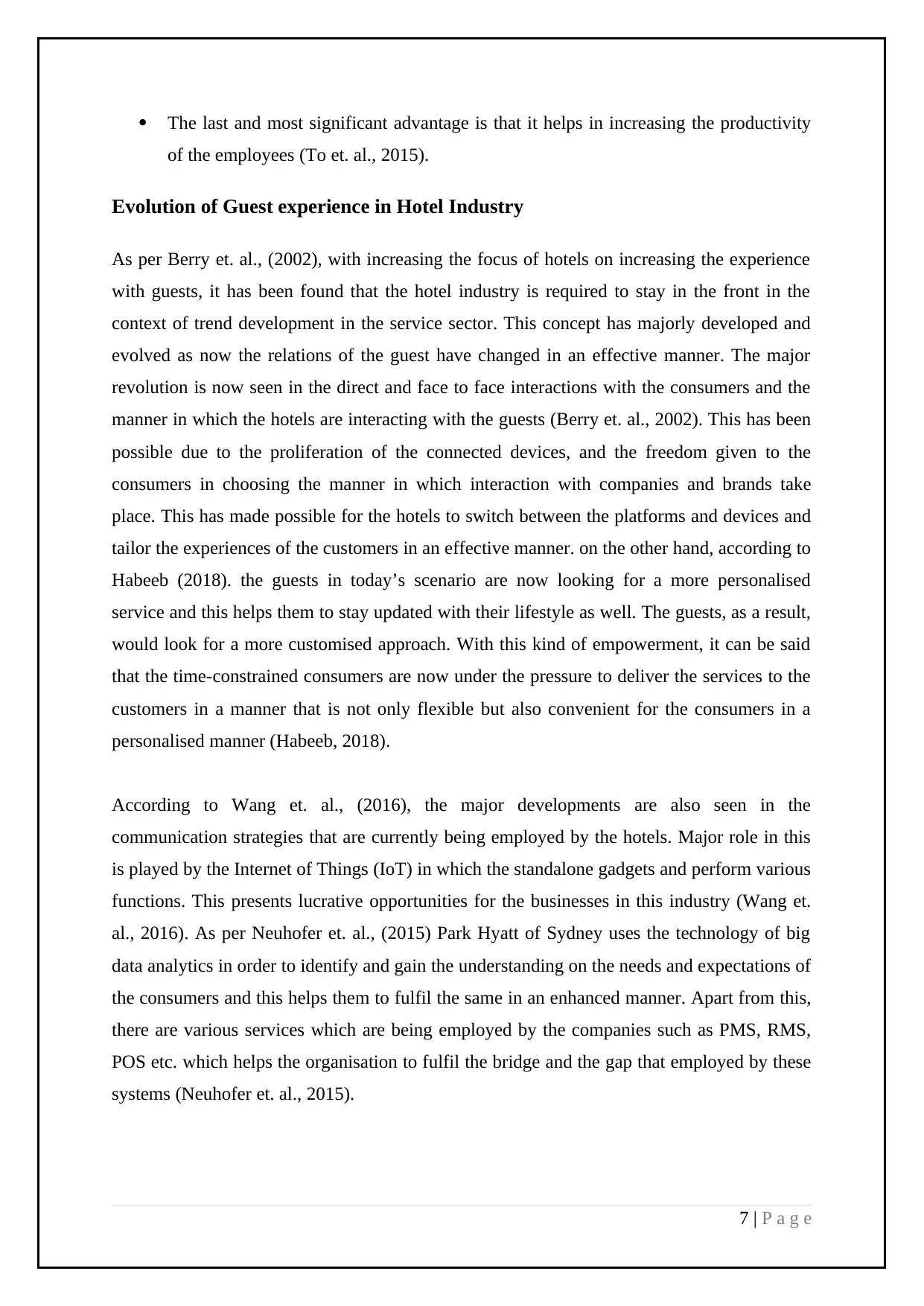
The last and most significant advantage is that it helps in increasing the productivity
of the employees (To et. al., 2015).
Evolution of Guest experience in Hotel Industry
As per Berry et. al., (2002), with increasing the focus of hotels on increasing the experience
with guests, it has been found that the hotel industry is required to stay in the front in the
context of trend development in the service sector. This concept has majorly developed and
evolved as now the relations of the guest have changed in an effective manner. The major
revolution is now seen in the direct and face to face interactions with the consumers and the
manner in which the hotels are interacting with the guests (Berry et. al., 2002). This has been
possible due to the proliferation of the connected devices, and the freedom given to the
consumers in choosing the manner in which interaction with companies and brands take
place. This has made possible for the hotels to switch between the platforms and devices and
tailor the experiences of the customers in an effective manner. on the other hand, according to
Habeeb (2018). the guests in today’s scenario are now looking for a more personalised
service and this helps them to stay updated with their lifestyle as well. The guests, as a result,
would look for a more customised approach. With this kind of empowerment, it can be said
that the time-constrained consumers are now under the pressure to deliver the services to the
customers in a manner that is not only flexible but also convenient for the consumers in a
personalised manner (Habeeb, 2018).
According to Wang et. al., (2016), the major developments are also seen in the
communication strategies that are currently being employed by the hotels. Major role in this
is played by the Internet of Things (IoT) in which the standalone gadgets and perform various
functions. This presents lucrative opportunities for the businesses in this industry (Wang et.
al., 2016). As per Neuhofer et. al., (2015) Park Hyatt of Sydney uses the technology of big
data analytics in order to identify and gain the understanding on the needs and expectations of
the consumers and this helps them to fulfil the same in an enhanced manner. Apart from this,
there are various services which are being employed by the companies such as PMS, RMS,
POS etc. which helps the organisation to fulfil the bridge and the gap that employed by these
systems (Neuhofer et. al., 2015).
7 | P a g e
of the employees (To et. al., 2015).
Evolution of Guest experience in Hotel Industry
As per Berry et. al., (2002), with increasing the focus of hotels on increasing the experience
with guests, it has been found that the hotel industry is required to stay in the front in the
context of trend development in the service sector. This concept has majorly developed and
evolved as now the relations of the guest have changed in an effective manner. The major
revolution is now seen in the direct and face to face interactions with the consumers and the
manner in which the hotels are interacting with the guests (Berry et. al., 2002). This has been
possible due to the proliferation of the connected devices, and the freedom given to the
consumers in choosing the manner in which interaction with companies and brands take
place. This has made possible for the hotels to switch between the platforms and devices and
tailor the experiences of the customers in an effective manner. on the other hand, according to
Habeeb (2018). the guests in today’s scenario are now looking for a more personalised
service and this helps them to stay updated with their lifestyle as well. The guests, as a result,
would look for a more customised approach. With this kind of empowerment, it can be said
that the time-constrained consumers are now under the pressure to deliver the services to the
customers in a manner that is not only flexible but also convenient for the consumers in a
personalised manner (Habeeb, 2018).
According to Wang et. al., (2016), the major developments are also seen in the
communication strategies that are currently being employed by the hotels. Major role in this
is played by the Internet of Things (IoT) in which the standalone gadgets and perform various
functions. This presents lucrative opportunities for the businesses in this industry (Wang et.
al., 2016). As per Neuhofer et. al., (2015) Park Hyatt of Sydney uses the technology of big
data analytics in order to identify and gain the understanding on the needs and expectations of
the consumers and this helps them to fulfil the same in an enhanced manner. Apart from this,
there are various services which are being employed by the companies such as PMS, RMS,
POS etc. which helps the organisation to fulfil the bridge and the gap that employed by these
systems (Neuhofer et. al., 2015).
7 | P a g e
Paraphrase This Document
Need a fresh take? Get an instant paraphrase of this document with our AI Paraphraser
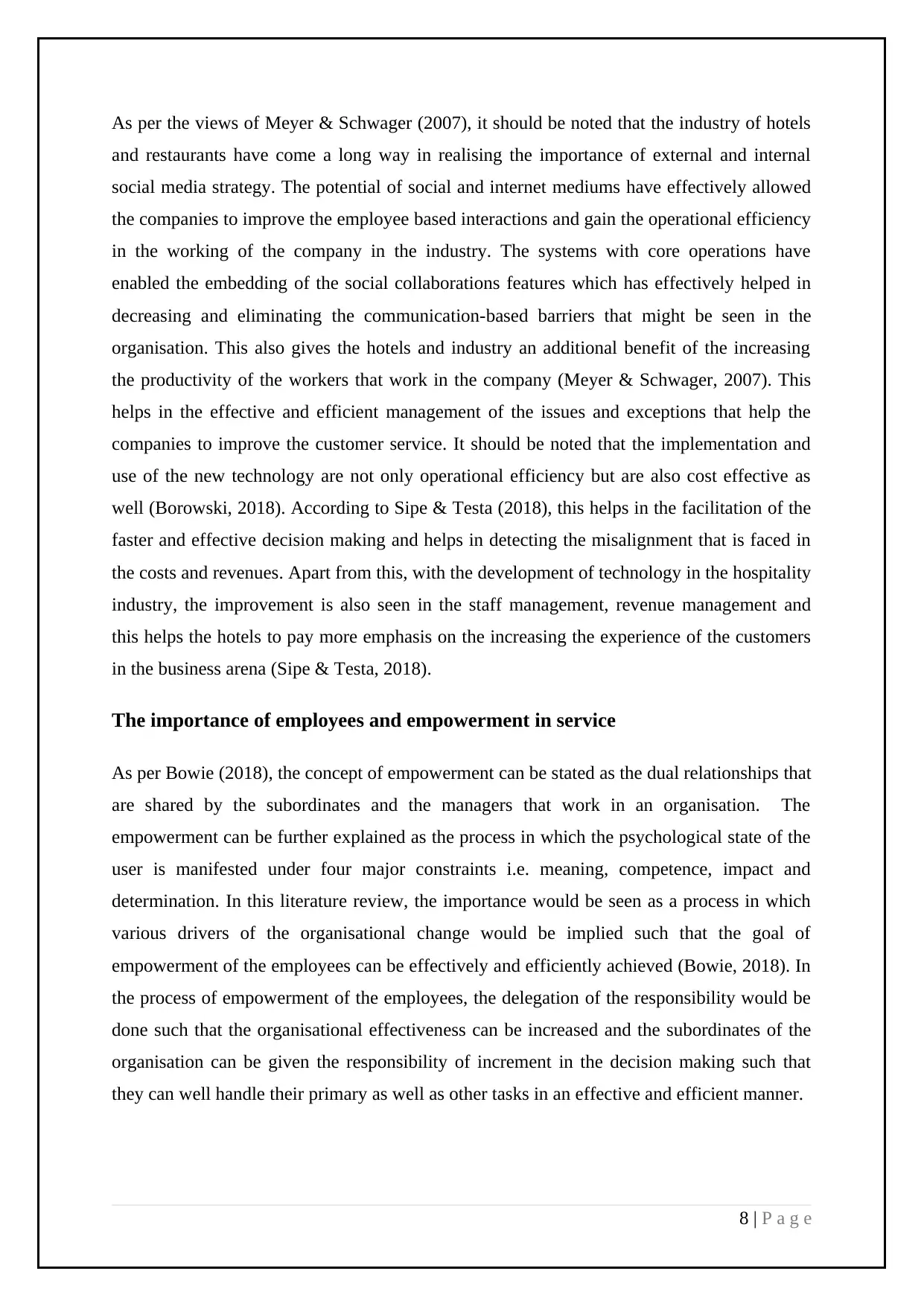
As per the views of Meyer & Schwager (2007), it should be noted that the industry of hotels
and restaurants have come a long way in realising the importance of external and internal
social media strategy. The potential of social and internet mediums have effectively allowed
the companies to improve the employee based interactions and gain the operational efficiency
in the working of the company in the industry. The systems with core operations have
enabled the embedding of the social collaborations features which has effectively helped in
decreasing and eliminating the communication-based barriers that might be seen in the
organisation. This also gives the hotels and industry an additional benefit of the increasing
the productivity of the workers that work in the company (Meyer & Schwager, 2007). This
helps in the effective and efficient management of the issues and exceptions that help the
companies to improve the customer service. It should be noted that the implementation and
use of the new technology are not only operational efficiency but are also cost effective as
well (Borowski, 2018). According to Sipe & Testa (2018), this helps in the facilitation of the
faster and effective decision making and helps in detecting the misalignment that is faced in
the costs and revenues. Apart from this, with the development of technology in the hospitality
industry, the improvement is also seen in the staff management, revenue management and
this helps the hotels to pay more emphasis on the increasing the experience of the customers
in the business arena (Sipe & Testa, 2018).
The importance of employees and empowerment in service
As per Bowie (2018), the concept of empowerment can be stated as the dual relationships that
are shared by the subordinates and the managers that work in an organisation. The
empowerment can be further explained as the process in which the psychological state of the
user is manifested under four major constraints i.e. meaning, competence, impact and
determination. In this literature review, the importance would be seen as a process in which
various drivers of the organisational change would be implied such that the goal of
empowerment of the employees can be effectively and efficiently achieved (Bowie, 2018). In
the process of empowerment of the employees, the delegation of the responsibility would be
done such that the organisational effectiveness can be increased and the subordinates of the
organisation can be given the responsibility of increment in the decision making such that
they can well handle their primary as well as other tasks in an effective and efficient manner.
8 | P a g e
and restaurants have come a long way in realising the importance of external and internal
social media strategy. The potential of social and internet mediums have effectively allowed
the companies to improve the employee based interactions and gain the operational efficiency
in the working of the company in the industry. The systems with core operations have
enabled the embedding of the social collaborations features which has effectively helped in
decreasing and eliminating the communication-based barriers that might be seen in the
organisation. This also gives the hotels and industry an additional benefit of the increasing
the productivity of the workers that work in the company (Meyer & Schwager, 2007). This
helps in the effective and efficient management of the issues and exceptions that help the
companies to improve the customer service. It should be noted that the implementation and
use of the new technology are not only operational efficiency but are also cost effective as
well (Borowski, 2018). According to Sipe & Testa (2018), this helps in the facilitation of the
faster and effective decision making and helps in detecting the misalignment that is faced in
the costs and revenues. Apart from this, with the development of technology in the hospitality
industry, the improvement is also seen in the staff management, revenue management and
this helps the hotels to pay more emphasis on the increasing the experience of the customers
in the business arena (Sipe & Testa, 2018).
The importance of employees and empowerment in service
As per Bowie (2018), the concept of empowerment can be stated as the dual relationships that
are shared by the subordinates and the managers that work in an organisation. The
empowerment can be further explained as the process in which the psychological state of the
user is manifested under four major constraints i.e. meaning, competence, impact and
determination. In this literature review, the importance would be seen as a process in which
various drivers of the organisational change would be implied such that the goal of
empowerment of the employees can be effectively and efficiently achieved (Bowie, 2018). In
the process of empowerment of the employees, the delegation of the responsibility would be
done such that the organisational effectiveness can be increased and the subordinates of the
organisation can be given the responsibility of increment in the decision making such that
they can well handle their primary as well as other tasks in an effective and efficient manner.
8 | P a g e
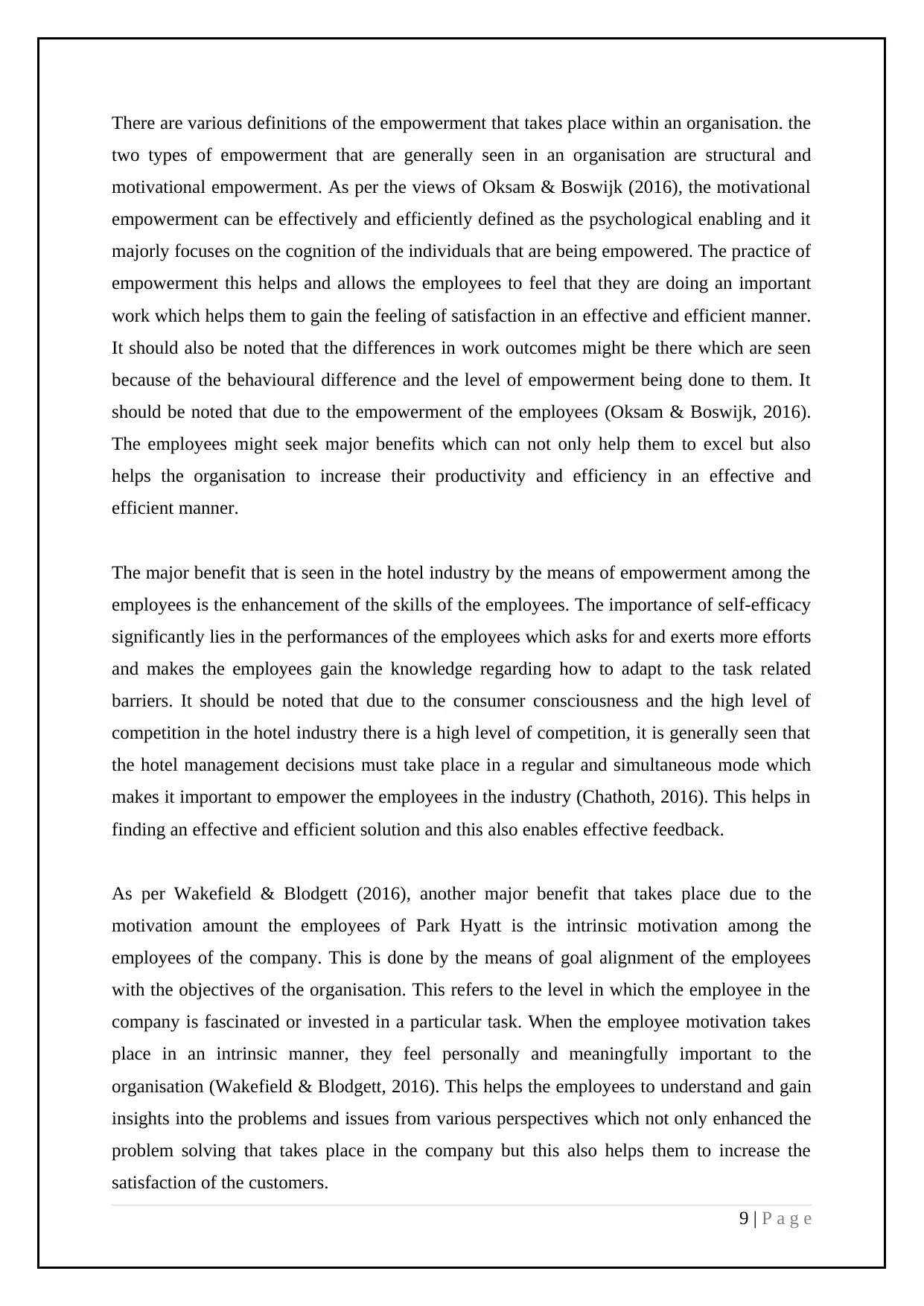
There are various definitions of the empowerment that takes place within an organisation. the
two types of empowerment that are generally seen in an organisation are structural and
motivational empowerment. As per the views of Oksam & Boswijk (2016), the motivational
empowerment can be effectively and efficiently defined as the psychological enabling and it
majorly focuses on the cognition of the individuals that are being empowered. The practice of
empowerment this helps and allows the employees to feel that they are doing an important
work which helps them to gain the feeling of satisfaction in an effective and efficient manner.
It should also be noted that the differences in work outcomes might be there which are seen
because of the behavioural difference and the level of empowerment being done to them. It
should be noted that due to the empowerment of the employees (Oksam & Boswijk, 2016).
The employees might seek major benefits which can not only help them to excel but also
helps the organisation to increase their productivity and efficiency in an effective and
efficient manner.
The major benefit that is seen in the hotel industry by the means of empowerment among the
employees is the enhancement of the skills of the employees. The importance of self-efficacy
significantly lies in the performances of the employees which asks for and exerts more efforts
and makes the employees gain the knowledge regarding how to adapt to the task related
barriers. It should be noted that due to the consumer consciousness and the high level of
competition in the hotel industry there is a high level of competition, it is generally seen that
the hotel management decisions must take place in a regular and simultaneous mode which
makes it important to empower the employees in the industry (Chathoth, 2016). This helps in
finding an effective and efficient solution and this also enables effective feedback.
As per Wakefield & Blodgett (2016), another major benefit that takes place due to the
motivation amount the employees of Park Hyatt is the intrinsic motivation among the
employees of the company. This is done by the means of goal alignment of the employees
with the objectives of the organisation. This refers to the level in which the employee in the
company is fascinated or invested in a particular task. When the employee motivation takes
place in an intrinsic manner, they feel personally and meaningfully important to the
organisation (Wakefield & Blodgett, 2016). This helps the employees to understand and gain
insights into the problems and issues from various perspectives which not only enhanced the
problem solving that takes place in the company but this also helps them to increase the
satisfaction of the customers.
9 | P a g e
two types of empowerment that are generally seen in an organisation are structural and
motivational empowerment. As per the views of Oksam & Boswijk (2016), the motivational
empowerment can be effectively and efficiently defined as the psychological enabling and it
majorly focuses on the cognition of the individuals that are being empowered. The practice of
empowerment this helps and allows the employees to feel that they are doing an important
work which helps them to gain the feeling of satisfaction in an effective and efficient manner.
It should also be noted that the differences in work outcomes might be there which are seen
because of the behavioural difference and the level of empowerment being done to them. It
should be noted that due to the empowerment of the employees (Oksam & Boswijk, 2016).
The employees might seek major benefits which can not only help them to excel but also
helps the organisation to increase their productivity and efficiency in an effective and
efficient manner.
The major benefit that is seen in the hotel industry by the means of empowerment among the
employees is the enhancement of the skills of the employees. The importance of self-efficacy
significantly lies in the performances of the employees which asks for and exerts more efforts
and makes the employees gain the knowledge regarding how to adapt to the task related
barriers. It should be noted that due to the consumer consciousness and the high level of
competition in the hotel industry there is a high level of competition, it is generally seen that
the hotel management decisions must take place in a regular and simultaneous mode which
makes it important to empower the employees in the industry (Chathoth, 2016). This helps in
finding an effective and efficient solution and this also enables effective feedback.
As per Wakefield & Blodgett (2016), another major benefit that takes place due to the
motivation amount the employees of Park Hyatt is the intrinsic motivation among the
employees of the company. This is done by the means of goal alignment of the employees
with the objectives of the organisation. This refers to the level in which the employee in the
company is fascinated or invested in a particular task. When the employee motivation takes
place in an intrinsic manner, they feel personally and meaningfully important to the
organisation (Wakefield & Blodgett, 2016). This helps the employees to understand and gain
insights into the problems and issues from various perspectives which not only enhanced the
problem solving that takes place in the company but this also helps them to increase the
satisfaction of the customers.
9 | P a g e
⊘ This is a preview!⊘
Do you want full access?
Subscribe today to unlock all pages.

Trusted by 1+ million students worldwide
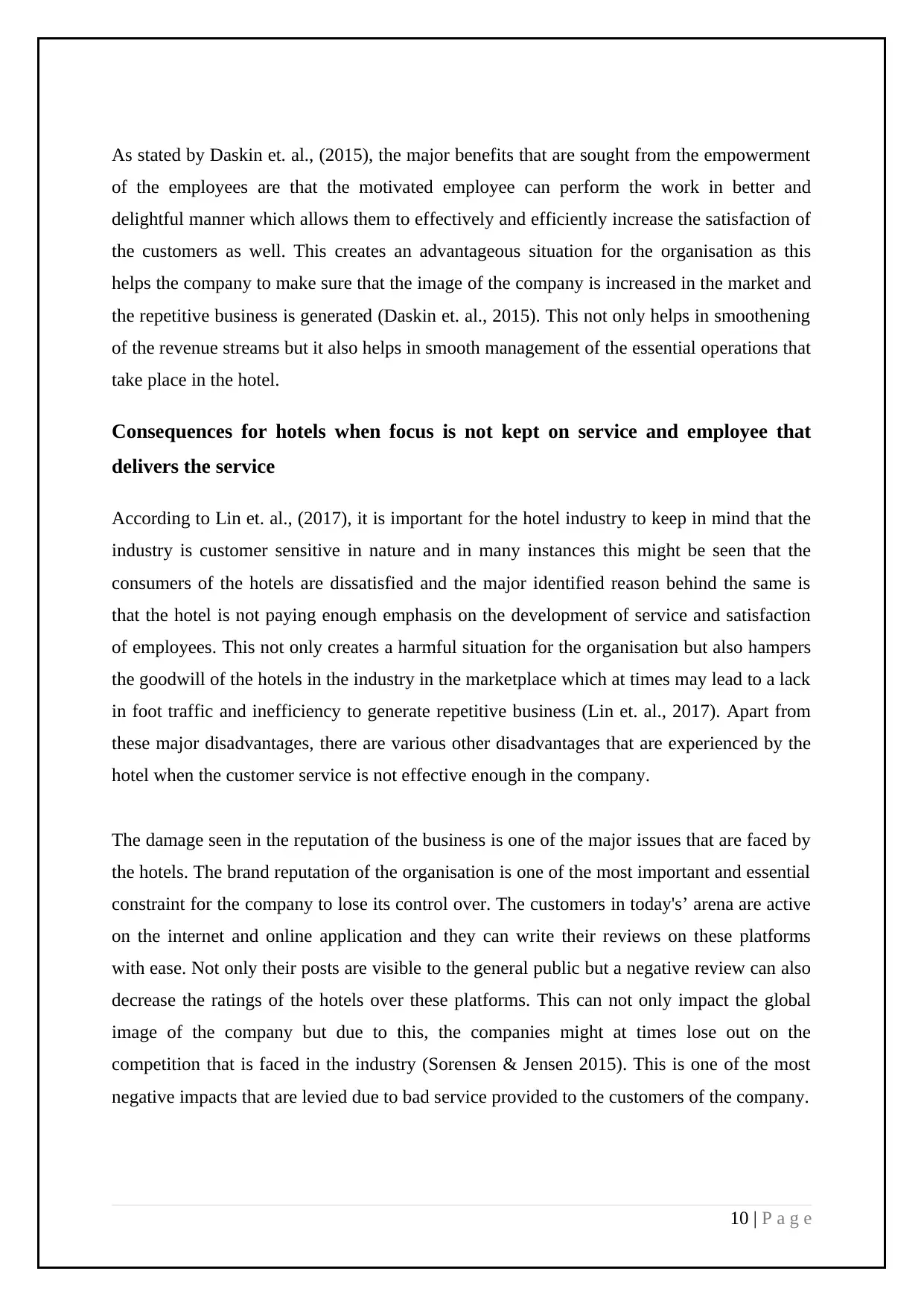
As stated by Daskin et. al., (2015), the major benefits that are sought from the empowerment
of the employees are that the motivated employee can perform the work in better and
delightful manner which allows them to effectively and efficiently increase the satisfaction of
the customers as well. This creates an advantageous situation for the organisation as this
helps the company to make sure that the image of the company is increased in the market and
the repetitive business is generated (Daskin et. al., 2015). This not only helps in smoothening
of the revenue streams but it also helps in smooth management of the essential operations that
take place in the hotel.
Consequences for hotels when focus is not kept on service and employee that
delivers the service
According to Lin et. al., (2017), it is important for the hotel industry to keep in mind that the
industry is customer sensitive in nature and in many instances this might be seen that the
consumers of the hotels are dissatisfied and the major identified reason behind the same is
that the hotel is not paying enough emphasis on the development of service and satisfaction
of employees. This not only creates a harmful situation for the organisation but also hampers
the goodwill of the hotels in the industry in the marketplace which at times may lead to a lack
in foot traffic and inefficiency to generate repetitive business (Lin et. al., 2017). Apart from
these major disadvantages, there are various other disadvantages that are experienced by the
hotel when the customer service is not effective enough in the company.
The damage seen in the reputation of the business is one of the major issues that are faced by
the hotels. The brand reputation of the organisation is one of the most important and essential
constraint for the company to lose its control over. The customers in today's’ arena are active
on the internet and online application and they can write their reviews on these platforms
with ease. Not only their posts are visible to the general public but a negative review can also
decrease the ratings of the hotels over these platforms. This can not only impact the global
image of the company but due to this, the companies might at times lose out on the
competition that is faced in the industry (Sorensen & Jensen 2015). This is one of the most
negative impacts that are levied due to bad service provided to the customers of the company.
10 | P a g e
of the employees are that the motivated employee can perform the work in better and
delightful manner which allows them to effectively and efficiently increase the satisfaction of
the customers as well. This creates an advantageous situation for the organisation as this
helps the company to make sure that the image of the company is increased in the market and
the repetitive business is generated (Daskin et. al., 2015). This not only helps in smoothening
of the revenue streams but it also helps in smooth management of the essential operations that
take place in the hotel.
Consequences for hotels when focus is not kept on service and employee that
delivers the service
According to Lin et. al., (2017), it is important for the hotel industry to keep in mind that the
industry is customer sensitive in nature and in many instances this might be seen that the
consumers of the hotels are dissatisfied and the major identified reason behind the same is
that the hotel is not paying enough emphasis on the development of service and satisfaction
of employees. This not only creates a harmful situation for the organisation but also hampers
the goodwill of the hotels in the industry in the marketplace which at times may lead to a lack
in foot traffic and inefficiency to generate repetitive business (Lin et. al., 2017). Apart from
these major disadvantages, there are various other disadvantages that are experienced by the
hotel when the customer service is not effective enough in the company.
The damage seen in the reputation of the business is one of the major issues that are faced by
the hotels. The brand reputation of the organisation is one of the most important and essential
constraint for the company to lose its control over. The customers in today's’ arena are active
on the internet and online application and they can write their reviews on these platforms
with ease. Not only their posts are visible to the general public but a negative review can also
decrease the ratings of the hotels over these platforms. This can not only impact the global
image of the company but due to this, the companies might at times lose out on the
competition that is faced in the industry (Sorensen & Jensen 2015). This is one of the most
negative impacts that are levied due to bad service provided to the customers of the company.
10 | P a g e
Paraphrase This Document
Need a fresh take? Get an instant paraphrase of this document with our AI Paraphraser
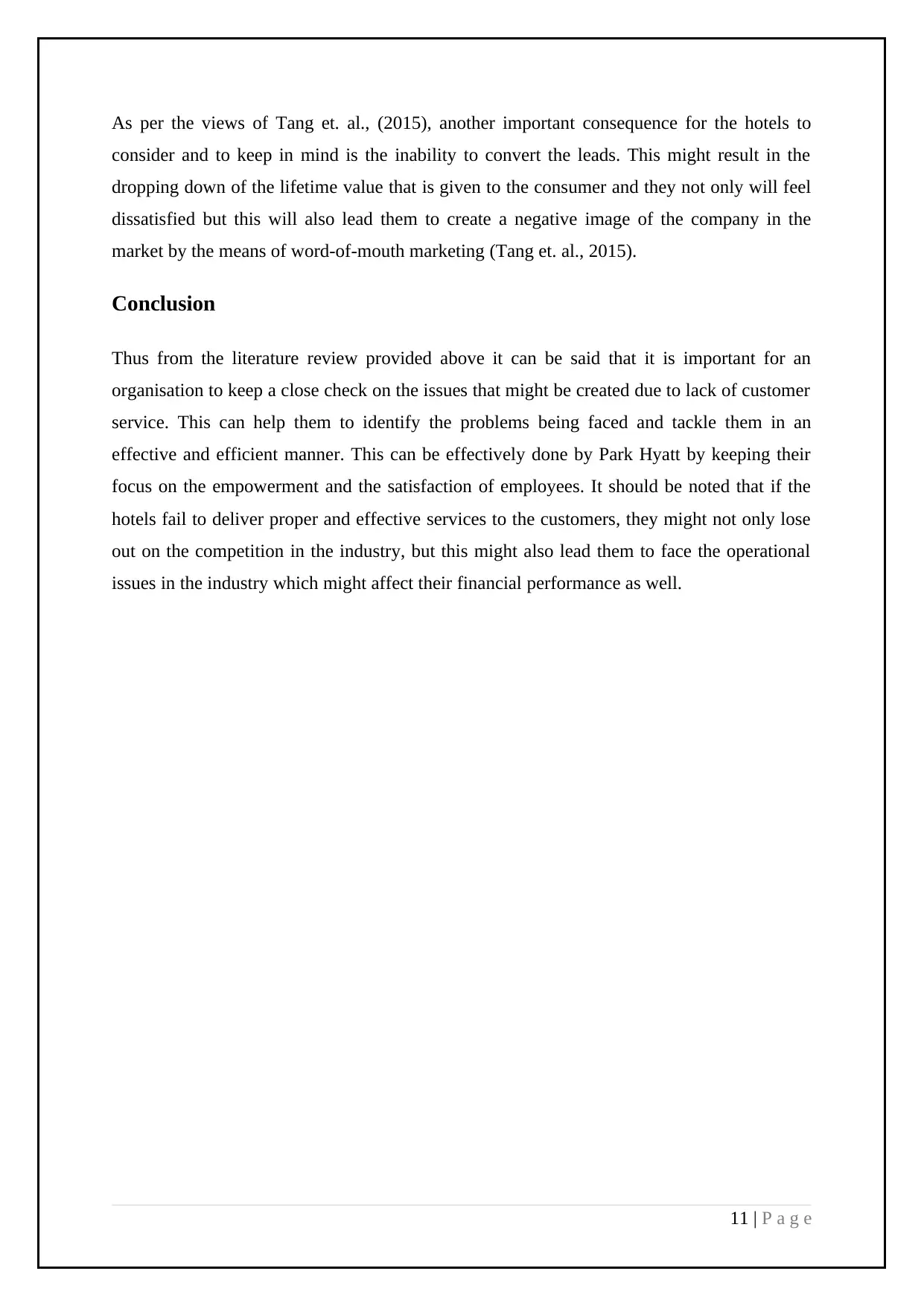
As per the views of Tang et. al., (2015), another important consequence for the hotels to
consider and to keep in mind is the inability to convert the leads. This might result in the
dropping down of the lifetime value that is given to the consumer and they not only will feel
dissatisfied but this will also lead them to create a negative image of the company in the
market by the means of word-of-mouth marketing (Tang et. al., 2015).
Conclusion
Thus from the literature review provided above it can be said that it is important for an
organisation to keep a close check on the issues that might be created due to lack of customer
service. This can help them to identify the problems being faced and tackle them in an
effective and efficient manner. This can be effectively done by Park Hyatt by keeping their
focus on the empowerment and the satisfaction of employees. It should be noted that if the
hotels fail to deliver proper and effective services to the customers, they might not only lose
out on the competition in the industry, but this might also lead them to face the operational
issues in the industry which might affect their financial performance as well.
11 | P a g e
consider and to keep in mind is the inability to convert the leads. This might result in the
dropping down of the lifetime value that is given to the consumer and they not only will feel
dissatisfied but this will also lead them to create a negative image of the company in the
market by the means of word-of-mouth marketing (Tang et. al., 2015).
Conclusion
Thus from the literature review provided above it can be said that it is important for an
organisation to keep a close check on the issues that might be created due to lack of customer
service. This can help them to identify the problems being faced and tackle them in an
effective and efficient manner. This can be effectively done by Park Hyatt by keeping their
focus on the empowerment and the satisfaction of employees. It should be noted that if the
hotels fail to deliver proper and effective services to the customers, they might not only lose
out on the competition in the industry, but this might also lead them to face the operational
issues in the industry which might affect their financial performance as well.
11 | P a g e
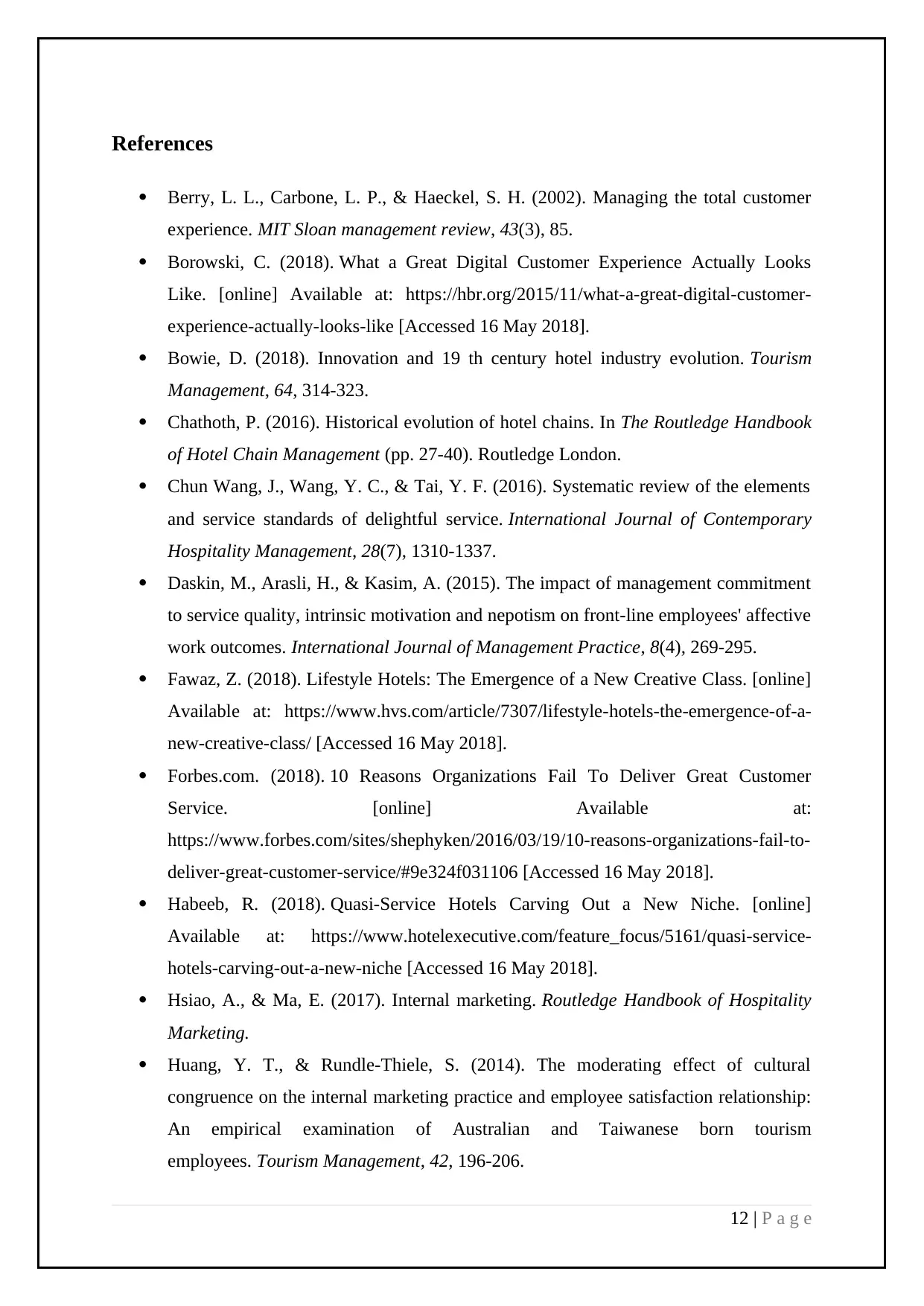
References
Berry, L. L., Carbone, L. P., & Haeckel, S. H. (2002). Managing the total customer
experience. MIT Sloan management review, 43(3), 85.
Borowski, C. (2018). What a Great Digital Customer Experience Actually Looks
Like. [online] Available at: https://hbr.org/2015/11/what-a-great-digital-customer-
experience-actually-looks-like [Accessed 16 May 2018].
Bowie, D. (2018). Innovation and 19 th century hotel industry evolution. Tourism
Management, 64, 314-323.
Chathoth, P. (2016). Historical evolution of hotel chains. In The Routledge Handbook
of Hotel Chain Management (pp. 27-40). Routledge London.
Chun Wang, J., Wang, Y. C., & Tai, Y. F. (2016). Systematic review of the elements
and service standards of delightful service. International Journal of Contemporary
Hospitality Management, 28(7), 1310-1337.
Daskin, M., Arasli, H., & Kasim, A. (2015). The impact of management commitment
to service quality, intrinsic motivation and nepotism on front-line employees' affective
work outcomes. International Journal of Management Practice, 8(4), 269-295.
Fawaz, Z. (2018). Lifestyle Hotels: The Emergence of a New Creative Class. [online]
Available at: https://www.hvs.com/article/7307/lifestyle-hotels-the-emergence-of-a-
new-creative-class/ [Accessed 16 May 2018].
Forbes.com. (2018). 10 Reasons Organizations Fail To Deliver Great Customer
Service. [online] Available at:
https://www.forbes.com/sites/shephyken/2016/03/19/10-reasons-organizations-fail-to-
deliver-great-customer-service/#9e324f031106 [Accessed 16 May 2018].
Habeeb, R. (2018). Quasi-Service Hotels Carving Out a New Niche. [online]
Available at: https://www.hotelexecutive.com/feature_focus/5161/quasi-service-
hotels-carving-out-a-new-niche [Accessed 16 May 2018].
Hsiao, A., & Ma, E. (2017). Internal marketing. Routledge Handbook of Hospitality
Marketing.
Huang, Y. T., & Rundle-Thiele, S. (2014). The moderating effect of cultural
congruence on the internal marketing practice and employee satisfaction relationship:
An empirical examination of Australian and Taiwanese born tourism
employees. Tourism Management, 42, 196-206.
12 | P a g e
Berry, L. L., Carbone, L. P., & Haeckel, S. H. (2002). Managing the total customer
experience. MIT Sloan management review, 43(3), 85.
Borowski, C. (2018). What a Great Digital Customer Experience Actually Looks
Like. [online] Available at: https://hbr.org/2015/11/what-a-great-digital-customer-
experience-actually-looks-like [Accessed 16 May 2018].
Bowie, D. (2018). Innovation and 19 th century hotel industry evolution. Tourism
Management, 64, 314-323.
Chathoth, P. (2016). Historical evolution of hotel chains. In The Routledge Handbook
of Hotel Chain Management (pp. 27-40). Routledge London.
Chun Wang, J., Wang, Y. C., & Tai, Y. F. (2016). Systematic review of the elements
and service standards of delightful service. International Journal of Contemporary
Hospitality Management, 28(7), 1310-1337.
Daskin, M., Arasli, H., & Kasim, A. (2015). The impact of management commitment
to service quality, intrinsic motivation and nepotism on front-line employees' affective
work outcomes. International Journal of Management Practice, 8(4), 269-295.
Fawaz, Z. (2018). Lifestyle Hotels: The Emergence of a New Creative Class. [online]
Available at: https://www.hvs.com/article/7307/lifestyle-hotels-the-emergence-of-a-
new-creative-class/ [Accessed 16 May 2018].
Forbes.com. (2018). 10 Reasons Organizations Fail To Deliver Great Customer
Service. [online] Available at:
https://www.forbes.com/sites/shephyken/2016/03/19/10-reasons-organizations-fail-to-
deliver-great-customer-service/#9e324f031106 [Accessed 16 May 2018].
Habeeb, R. (2018). Quasi-Service Hotels Carving Out a New Niche. [online]
Available at: https://www.hotelexecutive.com/feature_focus/5161/quasi-service-
hotels-carving-out-a-new-niche [Accessed 16 May 2018].
Hsiao, A., & Ma, E. (2017). Internal marketing. Routledge Handbook of Hospitality
Marketing.
Huang, Y. T., & Rundle-Thiele, S. (2014). The moderating effect of cultural
congruence on the internal marketing practice and employee satisfaction relationship:
An empirical examination of Australian and Taiwanese born tourism
employees. Tourism Management, 42, 196-206.
12 | P a g e
⊘ This is a preview!⊘
Do you want full access?
Subscribe today to unlock all pages.

Trusted by 1+ million students worldwide
1 out of 14
Related Documents
Your All-in-One AI-Powered Toolkit for Academic Success.
+13062052269
info@desklib.com
Available 24*7 on WhatsApp / Email
![[object Object]](/_next/static/media/star-bottom.7253800d.svg)
Unlock your academic potential
Copyright © 2020–2025 A2Z Services. All Rights Reserved. Developed and managed by ZUCOL.





